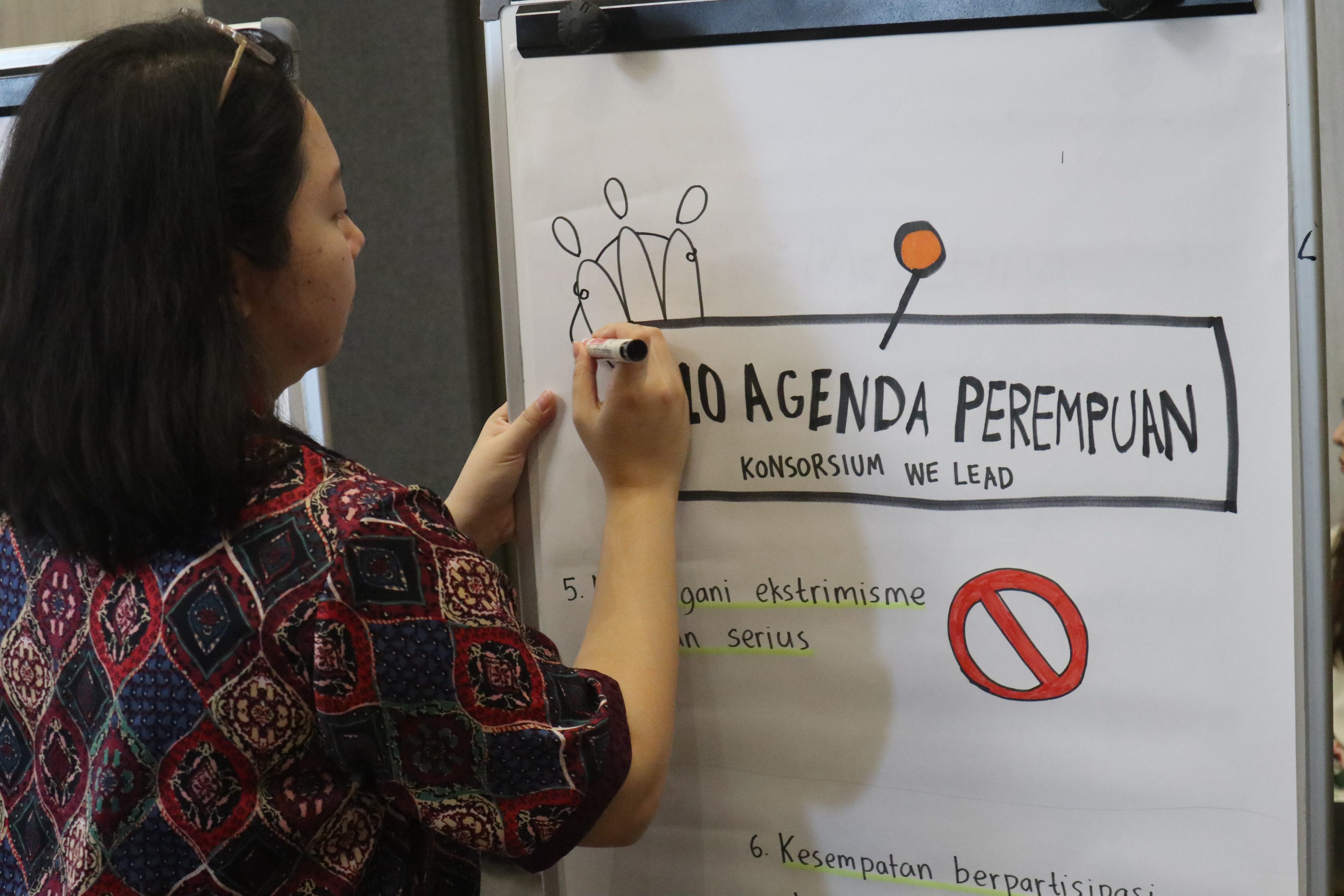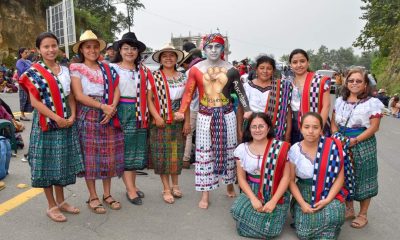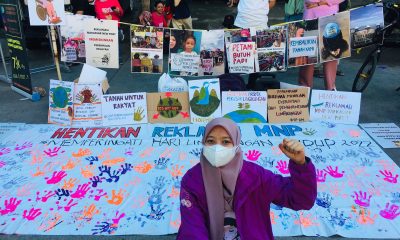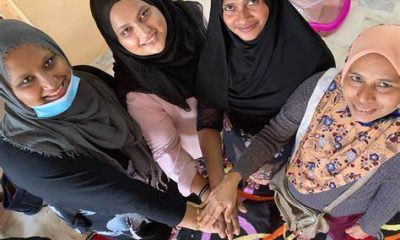By Laura Carlsen Km. 148 is a nodal point on the Interamerican Highway that connects…

By Osang Langara
A buzz of hope and excitement filled the spacious room as women from across the country arrived for the Women’s Conference (Rembuk Perempuan) in Bekasi, Indonesia in late May. The event, organized by the We Lead consortium, brought together a diverse group of 100 women, including women ulema (Muslim scholars), indigenous women, women workers, young women, academics, and NGO workers to discuss a women’s agenda ahead of the 2024 election.
The feeling in the room made it clear: change is coming, and it will happen when women stand together. As Desti Murdijana, JASS Program Coordinator in Indonesia remarked, “Regardless of who becomes the future president, we have to make sure that women’s voices are heard and that our women’s agenda is put on the table. We can only do that by working together.”
Over the three days together, the participants crafted a 10-demand agenda that articulates the aspirations and needs of women and the LGBTQ+ community. “We have so many dreams for the upcoming elections. We want women and children to be protected across Indonesia, we want an end to the exploitation of our natural resources, we want equality. We have 10 demands as our Women’s Agenda for the upcoming elections. Together, we push them forward so that they can be realized,” expressed a woman leader.
Co-led by JASS Southeast Asia and Hivos Southeast Asia and supported by Global Affairs Canada (GAC), the We Lead consortium challenges and counters the negative impact and influence of religious fundamentalisms on women’s freedoms. Operating in 14 Indonesian provinces, We Lead consists of 7 women’s rights organizations made up of 200 community-based women’s groups. These core organizations are Fahmina Institute, Forum Aktivis Perempuan (FAMM Indonesia), Perempuan Mahardhika, Rahima, and Rumah KitaB. In five years, the consortium has developed women-friendly Islamic narratives and regulations in Islamic institutions, and supported women human rights defenders opposing land grabs.
Indonesia’s Political Landscape
Indonesia will hold its general election next year, determining its next president, vice president, People’s Consultative Assembly (MPR), including the House of Representatives (DPR) and the Regional Representative Council (DPD), as well as local legislative members. With over 204 million total registered voters, the youth comprise 52 percent, making wooing millennials and Generation Z, pivotal in recent elections. With various candidacies already in flux and changing daily, analysts predict intense competition and unpredictability in the upcoming elections.
As the largest Muslim-majority nation, Indonesia is often seen as a moderate country that upholds religious freedom. However, concerns about growing fundamentalism, declining rights for women and LGBTQ+ people, rising gender-based violence, and limited women’s political engagement are rarely tackled by the government. The population also faces pressing socio-economic challenges, including inadequate social services, unemployment, and the impacts of extensive extractive projects on communities. The country, like much of the world, is recovering from Covid-19’s economic aftermath, having had the highest Covid-19 death toll in Southeast Asia. Repeated recessions have led to increasing poverty rates in recent years.
Mobilizing Around the Elections
Given Indonesia’s current realities, the We Lead consortium members are aware that the elections are not a magic bullet that will bring lasting change, but they see an opportunity to mobilize women in the communities to take an active role in changing society. “Political awareness of women and marginalized groups is very important. Most of the time, we feel intimidated by political processes but we have to realize that we can always collaborate with other groups and organizations as part of our collective strategy,” an Indonesian women human rights defender said during a group discussion at the Women’s Conference.
They also see the potential to draw the attention of electoral candidates to women’s needs and demands. “What we can see is that different organizations can use a shared voice to approach a single issue. This is an important learning point for us all: by working together from a shared voice, we can achieve a common aim,” said Tunggal Pawestri of Hivos Southeast Asia. Desti Murdijana echoes this observation: “This is our birth and our new beginning. This is how we look at how we can work together across 199 communities in Indonesia.”
What do Indonesian Women Want?
We Lead highlights that past elections caused polarization not just in the Indonesian society, but in the women’s movement. To address this, the consortium aims to use the jointly developed Women’s Agenda, involving local and national representatives to build unity and to bridge divisions within the women’s movement in the lead-up to this year’s elections. It also aims to use the Women’s Agenda as an advocacy tool to hold elected leaders accountable. Below are the 10 women’s demands that form the Indonesian Women’s Agenda for the elections:
- Ensure the protection of women and children. We demand that women, children, and marginalized groups be freed from various forms of violence. We encourage the development and implementation of gender-responsive policies, the abolition of discriminatory local regulations, the development of a gender-just education curriculum, and the provision of services that favor survivors of violence, including the provision of safe houses and the provision of adequate budget for the services and recovery of survivors.
- End the exploitation of natural resources. We demand an end to the exploitation and extraction of Indonesia’s natural resources, and encourage instead the protection of these natural resources as it is the source of local people’s livelihoods. We also demand the recognition of local land ownership. We encourage the reclaiming of ancestral lands, reforestation programs, and other initiatives that support forest sustainability and biodiversity. We also encourage the ratification of the Indigenous Peoples’ Bill.
- Provide basic services that are easily accessible. We demand the provision of basic services that are inclusive and affordable for the community, especially in remote islands. We also demand the presence of formal education institutions that accept women dropouts, so that they can continue their education until college, and the availability of a budget dedicated to the capacity building of women and other marginalized people, with the aim to create advocates who advance women’s and children’s rights.
- Fulfill the right to decent work. We demand the fulfillment of the right to decent work for women through the implementation of gender-responsive policies that provide equal opportunities for women to take on managerial positions, policies that take action against perpetrators of violence in companies, and policies that guarantee the maternity rights of women workers.
- Address extremism seriously. We demand a more serious and systematic approach in dealing with extremism, including by integrating gender perspective in counter terrorism policies, as well as removing or refusing the permits of public facilities that foster notions of intolerance.
- Create opportunities for participation in political processes. We demand equal opportunities for women and marginalized groups to be actively involved in political processes without being discriminated against, from local to national levels. Ensure the meaningful participation of women and marginalized groups in the formulation of public policies.
- Provide a healthy living environment. We demand a healthy environment for our present and our future: we encourage emission control, systematic waste management that involves community members, the elimination of economic activities that are damaging to the environment, the establishment of a trustworthy Environmental Impact Assessment (EIA) team, and the mass dissemination of environmental campaigns.
- Realize equitable economic justice. We demand economic justice through easily accessible markets for local products manufactured by women’s groups, production facilities that can be managed by women, improvements in the function of public facilities to increase women’s economic capacity, and provision of spaces for women to exercise their economic independence.
- Create infrastructure that is friendly and safe for women. We demand infrastructure that is friendly and safe for women and people with disabilities, and encourage the utilization of Indonesia’s natural resources to provide decent facilities and infrastructure for all.
- Protect Women Human Rights Defenders (WHRDs). We demand protection for women human rights defenders, an end to the criminalization of activists in the women’s movement, and the passage of policies that ensure protection mechanisms for WHRDs, both provided by the state and by the community.
Hope for the Future
“Historically, the system of elections has not been accommodating to women. In the upcoming elections, we want to push the government and policies that encourage more women to become a part of the political process. With women’s organizing, we have hope that women are included because women can lead (us) better.”
The Indonesian Women’s Conference, a culminating event after five years of awareness-raising strategies, on-ground organizing and solidarity efforts, celebrated a feeling of shared hope and resilience – and new collective voice and power – among women who participated.
Nena (pseudonym), a Dialita member (organization of former women political prisoners during Indonesia’s New Order era), encapsulates the sentiment: “Hope is something we must always have. Other people can kill our future, take things away from us, but we must always have hope. Up until the present day, we are still standing,”
The conference also marked a beginning – emerging and dynamic partnerships rooted in trust, love, and a shared goal to amplify voices and build collective power of Indonesian women.




























